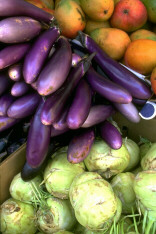
Organic Food
Organic food is produced by farmers who emphasize the use of renewable resources and the conservation of soil and water to enhance environmental quality for future generations. Organic meat, poultry, eggs, and dairy products come from animals that are given no antibiotics or growth hormones. Organic food is produced without using most conventional pesticides, petroleum-based fertilizers, or sewage sludge-based fertilizers, bio-engineering, or ionizing radiation. Organic systems replenish and maintain soil fertility, eliminate the use of toxic and persistent pesticides and fertilizers, and build biologically diverse agriculture The crux of food industry research of the last century has been focused primarily on developing chemical agriculture and modern food processing -- almost nothing was done to investigate side effects of conventional agriculture produce that are not obvious. Also, organics is an "if it ain't broke, don't fix it" matter, concerned in large part with what NOT to do -- "as much as possible, let Nature do its thing" -- rather than in creating exact methods for organic production. A strictly rules-based definition of organic farming and organic food, consisting of accepted inputs and practices, created and maintained by regulatory groups, is inevitably subject to "exceptions" and to special interest pressures to modify the rules. Early organic consumers were primarily looking for chemical-free, fresh or minimally processed food, and they had to buy directly from growers: Know your farmer, know your food was a practical reality. Organic food at first comprised mainly fresh vegetables. As consumer demand for organic foods continues to increase, high volume sales through mass outlets, typically supermarkets, is rapidly replacing the direct farmer connection. For supermarket consumers, food production is not easily observable and the chances of purchasing food that has been processed are extremely high.
|
|
Subscribe to receive latest news of promotion from our Company!
|
Organic Food Organic Food In Singapore Types Of Organic Food Healthy Organic Food Organic Food Suppliers Home Delivery About Organicfood.sg Contact Us
Copyright © 2005- Organicfood.sg
 Organic food is classified as the healthiest
type of food that any human being can consume. Organic
food is food produced without using most conventional
pesticides, fertilizers made with synthetic
ingredients or other products that are harmful to the
human body once being consumed.
Organic food is classified as the healthiest
type of food that any human being can consume. Organic
food is food produced without using most conventional
pesticides, fertilizers made with synthetic
ingredients or other products that are harmful to the
human body once being consumed.